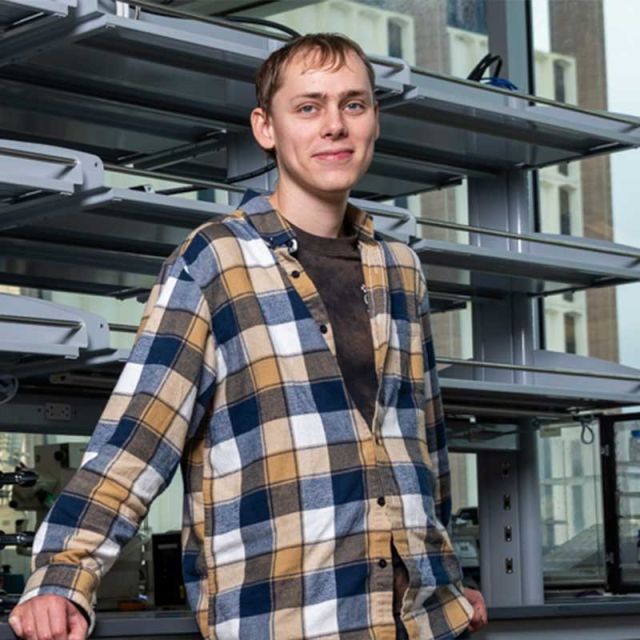
William Whitehead – MS/PhD student in Computer Engineering
In William’s own words – Interviewed during the 2023 year
- Hometown: Davis, CA
- Previous Degrees: B.S. in EE from UCLA
- Degree Sought from UCSB: 4th year in pursuit of MS/PhD in ECE
- Advisor / Lab or Group Name: Luke Theogarajan / Biomimetic Circuits & Nanosystems Group
- ECE Research Area: Computer Engineering
- Hobbies and Interests: reverse engineering, forward biking
William’s Research
- Main Area of Research: Designing new probabilistic computing architectures to directly emulate the Potts model
- Research Topics: Probabilistic computing, VLSI, mixed-signal design, scanning microscopy, system miniaturization
- Publication: Whitehead, W., Nelson, Z., Camsari, K.Y. et al. CMOS-compatible Ising and Potts annealing using single-photon avalanche diodes. Nat Electron (2023)
Favorite things about
- Department: The ECE shop has a lot of parts in stock, which makes it easy to quickly test a wide range of simple things without having to place orders for parts and sit around waiting for them to arrive.
- UCSB: UCSB, and by extension the graduate student housing (which is nice while you have it), is within walking distance to the airport, which is great when you have an early flight and there aren’t any Uber drivers available.
- Santa Barbara: The natural beauty - mountains, oceans, other open spaces - are of course the greatest draw, and can serve as great thinking spaces. Unfortunately, housing options are poor, and public transportation is lacking, especially in the sprawling suburban portions of Santa Barbara. The freeway’s bisection of the town is also a real bummer.
William and his research
Tell us about your research:
In the past decade the concept of the probabilistic ‘pbit’ was introduced as an intermediate step between deterministic bit computing and quantum qbit computing. My research explores the possibility of extending the concept and physical implementation of pbits from their current binaryness into many-state probabilistic units. While this requires more complex computing hardware, using many-state probabilistic units can be more algorithmically efficient. We are realizing these units using circuits based on single-photon avalanche diodes, which, by harnessing the randomness of quantum events, provide the required stochasticity.
How and why did you get into your area of research?
I chanced into my research topic through a combination of suggestions from my advisor and ideas found while walking about.
Why did you select UCSB and Computer Engineering in regards to your research?
People I worked with when I was an intern at the Aerospace Corporation spoke highly of the department.
What do you find rewarding about your research?
Getting complex systems (chip designs, testing platforms, or software models) to come out exactly how I want is satisfying. A big part of the process is taking these complex systems and organizing them into a structure or hierarchy that makes them easy to understand and work with.
Thoughts on working in a group research environment:
Having the same set of people around, day after day, is especially useful when you’re developing advanced concepts.
UCSB Prides itself on its collaborative atmosphere, give some examples of how you collaborate:
Many of the research projects in my lab are, and have been, collaborations with other groups at UCSB so that the specialized knowledge (and lab equipment) of both groups can be combined into more interesting or rigorous projects. While I myself have not had close collaborations outside my research group, whenever I talk to other faculty they do express interest in collaborating.
Academics at UCSB
Favorite course:
Information Theory (ECE 205), taught by Professor Ken Rose. He conveyed information theory very clearly, and it has given me an interesting perspective on a lot of different topics, even though there isn’t much space to use it rigorously in my own research.
Describe your Graduate Student Researcher (GSR) and/or Teaching Assistant (TA) experiences:
GSR and TA funding are both mixed bags. While I’m not fond of teaching, being a TA - even for simple courses - is good for exercising rusty sets of knowledge. Funding as a GSR is great when it aligns with your thesis goals, but otherwise it can be difficult to balance thesis work against the research projects you are expected to complete for your GSR position. For most people, the easy way out is to just accept the grant topic as a thesis topic, which (I think) is a little unfortunate.
Life as a graduate student
Advice to prospective graduate students:
Don’t expect anything in particular. Take opportunities that arise, rather than forcing yourself down a path that doesn’t make sense.
Tell us about your summer break:
This past summer I stayed at UCSB for research and took some time off to travel. Next summer, who knows. Once you are done (or even just mostly done) taking classes, summer loses its distinction as a break.
Future Plans...
Where will your research take you next and what are your future Career Goals:
I hope to step away from the more speculative work that I do now, but still be somewhere where I get to apply the broad set of creative and analytical skills that I’ve acquired. That will probably mean going to industry, but I’ll be open to government positions as well. Location will be as big of a decision-driver as the nature of the job.